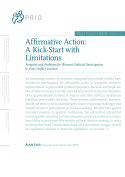An increasing number of countries emerging from armed conflict have introduced mechanisms for affirmative action to guarantee women’s representation in post-conflict political processes. Burundi and Nepal are two of these countries, and both introduced quotas to bring about an unprecedented number of women into their political institutions after post-conflict elections. These positive achievements, however, should not deter us from the many remaining challenges that impede women’s participation in decision-making. Women have gained increased presence in political institutions, but entrenched patriarchal norms, gender inequality and discriminatory practices continue to hinder their ability to participate effectively in political decision-making. In order to reverse this trend, broader attitudinal and institutional changes as well as a qualitative increase in their capabilities are in order.
Falch, Åshild (2010) Affirmative action: A kick-start with limitations, PRIO Policy Brief, 2. Oslo: PRIO.








